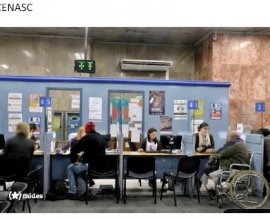The Uruguayan Ministry of Social Development undertakes impact evaluations of programmes that promote social inclusion
Work was done on the impact evaluation techniques in a workshop supported by the European Union's EUROsociAL Programme
The Office of Monitoring and Evaluation (DINEM) of the Ministry of Social Development (MIDES) is responsible for stewardship of the monitoring and evaluation of plans, programmes, actions, instruments, and projects in the country, as well as for the construction and management of the information necessary for improving their implementation and design.
Since 2005, the DINEM has been conducting evaluations of the social programmes implemented by the MIDES and, particularly in the last two years, has been expanding impact evaluations. In this context, the MIDES considered it necessary to strengthen, expand and consolidate the technical skills of the DINEM team to conduct impact evaluations of programmes that promote social inclusion.
To do this, the MIDES asked the EUROsociAL Programme for specific support in this area with the objective of adding multi-level impact evaluation techniques and designing the methodology for the evaluations to be conducted in 2015. In December 2014 a specific workshop was held with a EUROsociAL expert.
As a result, the DINEM to date has added multi-level impact evaluation techniques to the following MIDES programmes:
- Aulas Comunitarias (Community Classrooms) Programme: reintegration of adolescents into the formal educational path at the intermediate level of the basic education cycle
- Maestros Comunitarios (Community Teachers) Programme: new forms of schooling in contexts of high social vulnerability, based on numerous indicators that reveal the need to diversify the educational offering in the most disadvantaged social sectors.
- Servicios de Orientación, Consulta y Articulación Territorial (Guidance, Consultation and Territorial Coordination Services) (SOCAT): services that aim to boost community development and activate public and private local protection networks through the participation of residents and public and private institutions, which have in common the fact that they work or live in the same territory.
- Cercanías (Proximity) Programme: an inter-agency strategy that aims to improve the efficiency of State interventions to address situations of extreme social vulnerability. It seeks to overcome fragmentation and overlap, and improve the coordination of services at the territorial level, work in networks, and comprehensiveness at the first level of attention.
- Jóvenes en Red (Networked Youth) Programme: a programme that promotes the exercise of rights by adolescents and young people aged 14 to 24 who are disconnected from the educational system and the formal job market using a comprehensive, territorial and community-based approach.
- Canasta de Servicios (Services Basket): this seeks to guarantee access to electricity, water and supergas to the most vulnerable families
- Uruguay Trabaja (Uruguay At Work) Programme: a programme that offers the possibility of doing community service for a period of up to eight months and receiving a stipend known as "Support for Job Market Integration".
IILA

